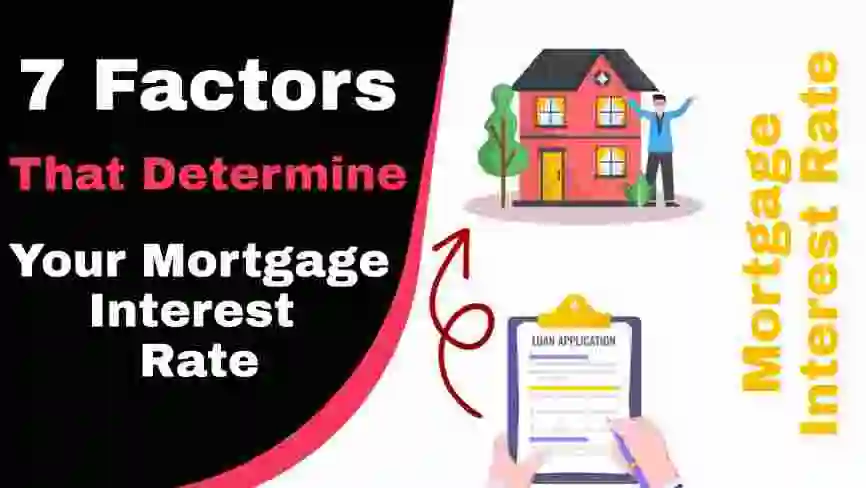Today we are discussing 7 Factors That Determines Mortgage Interest Rates.
A mortgage is a loan that helps you purchase a house. Getting approved can be done either by yourself or with the help of a broker. Approval involves filling out paperwork, providing documentation, and being assessed by the lender.
But before that let us first know what is Mortgage Interest Rate.
What is Mortgage Interest Rate
The interest rate is the cost of borrowing money. It is usually expressed as an annual percentage of the amount borrowed, and it determines how much you will have to repay each year.
The interest rate on a mortgage loan is calculated by adding up the interest for each year and then dividing it by the number of years in your mortgage term.
Interest rates are determined by a number of factors, including:
– The type of mortgage loan you take out (e.g., fixed or variable)
– Your credit score
– The size of your down payment
– Your income
Major Factors that Determine Your Mortgage Interest Rate

Here are 7 major factors that determine your mortgage interest rates:
- Loan-to-Value (LTV) Ratio
- MCLR Rates
- Type of Interest
- Credit Score
- Location of the Property
- Your Job Profile
- Tenure of the Loan
1. Loan-to-Value (LTV) Ratio
Interest rates for home loans are calculated by two variables – the Loan-to-Value Ratio and the Margin. The LTV Ratio is a measure of how much money you have borrowed relative to the value of your property. It is expressed as a percentage and is calculated by dividing the amount borrowed (Loan) by the estimated market value (Home Value).
There are two types of LTV ratios –
1. The maximum LTV ratio allowed by a lender in order to qualify for a loan is 80%
2. A borrower’s debt-to-income ratio should not exceed 43% in order to qualify for a loan
A home loan is a type of loan given to people for the purchase of homes. The LTV ratio for a home loan is calculated by dividing the amount of the home mortgage by the property’s appraised value.
The LTV ratio is used as an indicator of how much equity the homeowner has in their property and how much they are borrowing from lenders.
2. MCLR Rates ( Marginal Cost of Funds based Lending Rate)
The MCLR rates are a benchmark for the interest rate on home loans. It is calculated by adding a margin to the cost of funds. The cost of funds includes the bank’s own funding costs, plus an assumed return on assets.
The MCLR rates are calculated on a daily basis and are based on the lending rate of the banks. The lending rates depend upon various factors like demand for loans, supply of loans, and credit risk.
3. Type of Interest
The interest rate on a mortgage loan is the fee that is charged for borrowing money for a specified period of time. There are two types of interest rates that are charged: fixed and variable.
Fixed interest rates are set at the start of the term and do not change over the life of the loan.
Variable interest rates can fluctuate over time, which means they may be higher or lower than their initial rate depending on market conditions.
Fixed-rate mortgages are generally better for people who want to know exactly how much they will be paying each month because they do not have to worry about fluctuating rates going up or down.
However, people who expect their income to increase over time may want to consider a variable-rate mortgage because it will adjust with their income and allow them to take advantage of lower rates when possible.
4. Credit Score
A credit score represents the creditworthiness of a borrowing person. It is calculated based on factors like repayment history, debt, length of credit history, new credit and type of credit.
Your Credit Score determines what interest rate and EMI you will be offered for your home loan. The higher your Credit Score, the lower the interest rate and EMI you will get on your home loan.
A high Credit Score means that you are more likely to qualify for loans with lower interest rates and EMIs; low-interest loans can save you money in the long run because they reduce your monthly repayments.
5. Location of the Property
The interest rate is the cost or you can say the charge against borrowing money. It is paid by the borrower to the lender in exchange for being allowed to use the money. The interest rate varies depending on different types of factors:
– The type of loan is taken
– The creditworthiness of the borrower
– The time period over which, amt will be repaid
– The country where it is located
– The currency in which it is denominated
Interest rates are typically quoted as an annual percentage so that they can be compared with other rates. For example, if someone has a mortgage at 4% and their credit card has an interest rate of 20%, they are paying more interest for their credit card than for their mortgage.
Read Also: What is Mortgage Rate?
6. Your Job Profile
Home loan interest rates and EMI calculator helps people to calculate their monthly home loan repayments.
A home loan is a long-term financial product that helps people to buy a house or property. The borrower gets the money from the lender and pays it back with interest over a fixed period of time.
They can also use the money for other purposes such as renovation or repairs, or even for buying another property. The borrower needs to pay back the principal amount plus interest on a monthly basis for a fixed number of years.
The repayment term is decided by the lender based on their assessment of how much risk they are willing to take on with this particular borrower.
The home loan interest rate is calculated by adding up all the charges in your mortgage agreement, such as origination fee, application fee, appraisal fee and others, and then dividing it by your total mortgage balance (principal + interest).
The EMI stands for Equated Monthly Instalment
7. Tenure of the Loan
Interest rates are a major factor in deciding whether or not to take a home loan. It is important to know the tenure of the loan for home loan interest rate and EMI so that you can decide which one suits your needs best.
The tenure of the loan for home loan interest rate and EMI is an important factors that should be taken into account when choosing a mortgage.
The tenure of the mortgage is the period during which you have to repay it.
It can range from 10 years to 30 years or more, depending on your circumstances.
It also determines how much you will pay in interest over the course of your mortgage term, as well as what monthly instalments will be required from you each month.
The longer your tenure, the more money you will end up paying in interest over time and the more money you will need to pay each month for repayment.
Conclusion
In this article, we have discussed 7 Factors That Determine Your Mortgage Interest Rate in a simple and informative tone. If you had read the article completely then I hope you got the answer here that you were looking for. Thanks for reading the article.
